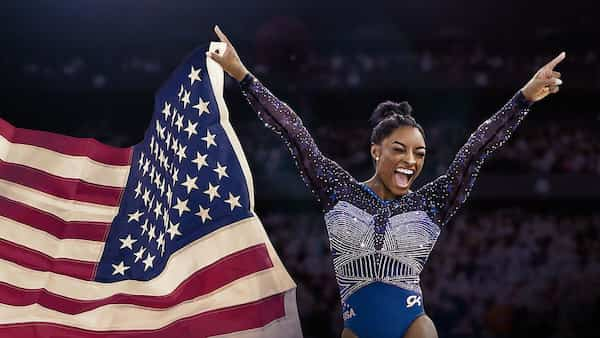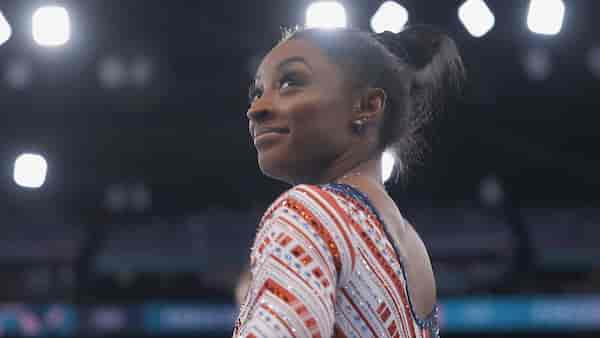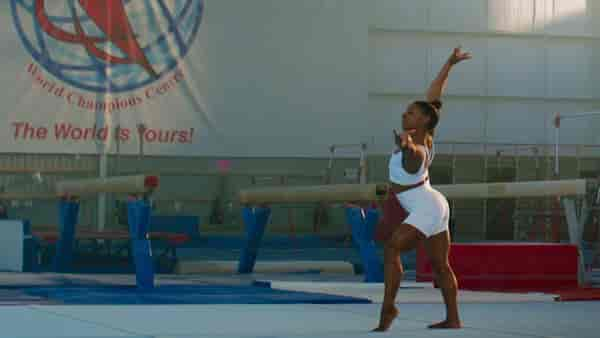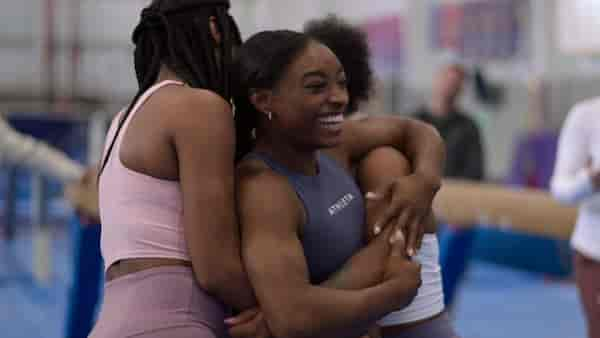Simone Biles Rising Is A Human Documentary On A Superhuman Athlete
Simone Biles Rising is another concrete brick in the wall of mental-health sports documentaries which serve as antidotes to win-at-all-cost and outer-conflict sports narratives.

Still from Simone Biles Rising.
Last Updated: 03.26 PM, Nov 08, 2024
IF ONE WERE TO look back at the 2024 Paris Olympics in isolation, it was business as usual for Simone Biles. 3 golds and 1 silver only solidified the United States athlete’s status as the greatest gymnast of all time. To an outsider who tunes into international sport once every four years, there was never any doubt: she came, she saw, she conquered (again). But context in sport, as in life, is everything.
Viewing Biles’ Paris performance in isolation — devoid of what preceded and shaped it — is like celebrating swimming GOAT Michael Phelps’ Rio 2016 medal haul or football GOAT Lionel Messi’s 2022 World Cup victory as inevitable extensions of their legacies. Never mind that Phelps was arrested and unfit to swim a few seasons before that, or that Messi had retired as an Argentina footballer after losing another Copa America final. It’s never that simple, especially in the case of once-in-a-lifetime champions whose mental fortitude is often invisibilised in their pursuit of perfection. They win so much that their comebacks — their conflicts, miracles and underdog journeys — revolve around the toll of winning.
For most of them, the “what now?” syndrome threatens to mortalise them. Being ‘mentality monsters’ comes at a price. But it’s different for Simone Biles, a young Black American woman who defied more than just inner demons to win in Paris. Katie Walsh’s 4-part documentary series, Simone Biles Rising, neatly captures the “stakes”: socially, personally and culturally. It’s difficult to convince the viewer that the most decorated athletes are often the most vulnerable, but the series does a fine job of understanding the person within the image, the heart within the body. She’s 27 in Paris, an age considered old in modern gymnastics. She’s supposed to have retired by now, but instead, she becomes one of the only gymnasts to compete and medal at 3 Olympics — a shelf-life as remarkable as Serena Williams winning past 40 as a mom in tennis. Most importantly, nobody anticipated her to keep going after what happened 3 years ago.

Simone Biles Rising starts off by following Biles during the pandemic-curtained Tokyo Olympics in 2021, the trigger for everything that follows. Biles arrived in Japan as a global superstar on the brink of immortality; records were to fall, limits were to be redefined, and history was to be rewritten. But Biles famously got lost during her routine, and had a serious case of the “twisties” — a gymnast condition where the body and mind fall out of sync — during the team final and subsequently pulled out of most of her events. A team silver and an individual bronze are all she came back with: a haul that might have been considered successful for an ordinary striver. The camera stays with her during the crisis, treating it as more of a naked moment than a narrative catalyst. We see her mother, back home, getting a frantic phone call from her; the older woman reassures Biles that she needn’t continue. She immediately senses that perhaps this was a long time coming.
The series then delves into the sport's history in a way that puts Biles’ Tokyo experience into full perspective. The first two parts examine the toxic culture of gymnastics — inhuman training regimes, frightfully young aspirants, abusive foreign coaches and an exploitative institution — leading up to the era of Biles. Former champions and journalists are interviewed about the changing landscape. This includes the infamous sex abuse scandal, where US team doctor and serial child rapist Larry Nassar used his position to sexually assault hundreds of young athletes for years. Simone Biles was one of the athletes who gave an emotional testimony. The documentary doesn’t dwell on any single reason or problem, letting the viewer craft a mental map of Biles’ rise against the odds.

The documentary doesn’t spell it out, but it's implied that Tokyo became an accumulative trauma response for the peerless Biles. It never suggests that she “crumbled” under pressure or “quit” — despite the sensationalist media discourse — and instead chooses to build up to the most obvious conclusion: Biles showed the courage to put herself first. In a sport that normalises pain, selflessness and sacrifice to a fault, her decision starts to stand out. The next two episodes focus on Biles working her way back to the top — overcoming the twisties, embracing her past and personal life (an athlete husband, protective grandparents who legally adopted her), staring down the spotlight — over a World Championship trail, the US qualifiers and eventually, the post-pandemic Paris Olympics.
The filmmaking employs cinematic technique by juxtaposing a teeming Paris with a lonely Tokyo. This time, her family, her husband and friends cheer her on in person, leaving no room for the self-doubt that surfaced in the empty void of Tokyo three years prior. At 27, Biles wins more medals, but her superhuman legacy is reframed as one defined by her ability to be human. She comes into reach, as just another woman who inspires the world by being herself.

Genre-wise, Simone Biles Rising is another concrete brick in the wall of mental-health sports documentaries — intense psychological dramas unto themselves. It belongs to the extraordinary league of Ben Stokes: Phoenix from the Ashes, Andy Murray: Resurfacing and Naomi Osaka. All of them serve as antidotes to win-at-all-cost and outer-conflict sports narratives. The takeaways are almost similar, in that the storytelling prompts these champions to stop being stories. The makers aren’t therapists so much as listeners, creating a safe space for them to shed the baggage and think for themselves. This one allows Biles’ personality to shine through, deftly connecting the steely-eyed athlete to the lively 27-year-old girl building her dream house. The house is completed by the end of the series — and Simone Biles finally comes home.
Simone Biles Rising is currently streaming on Netflix.

 Premium
Premium